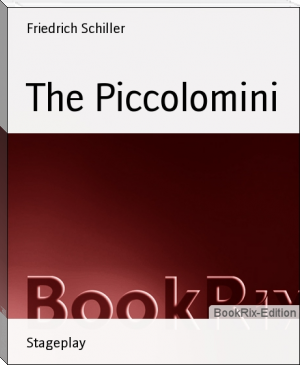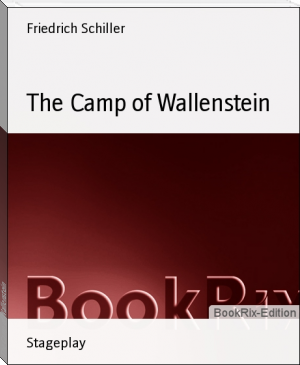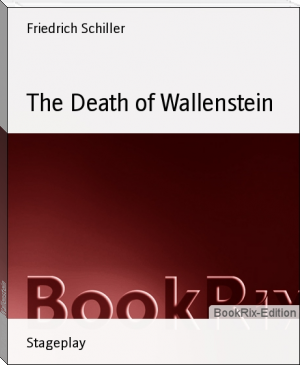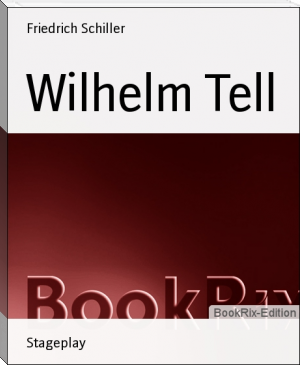The Piccolomini - Friedrich Schiller (electronic book reader .TXT) 📗

- Author: Friedrich Schiller
Book online «The Piccolomini - Friedrich Schiller (electronic book reader .TXT) 📗». Author Friedrich Schiller
The best wine! Oh, if my old mistress, his lady mother, could but see these wild goings on she would turn herself round in her grave. Yes, yes, sir officer! 'tis all down the hill with this noble house! no end, no moderation! And this marriage with the duke's sister, a splendid connection, a very splendid connection! but I will tell you, sir officer, it looks no good.
NEUMANN. Heaven forbid! Why, at this very moment the whole prospect is in bud and blossom!
MASTER OF THE CELLAR. You think so? Well, well! much may be said on that head.
FIRST SERVANT (comes). Burgundy for the fourth table.
MASTER OF THE CELLAR. Now, sir lieutenant, if this aint the seventieth flask----
FIRST SERVANT. Why, the reason is, that German lord, Tiefenbach, sits at that table.
MASTER OF THE CELLAR (continuing his discourse to NEUMANN). They are soaring too high. They would rival kings and electors in their pomp and splendor; and wherever the duke leaps, not a minute does my gracious master, the count, loiter on the brink--(to the SERVANTS). What do you stand there listening for? I will let you know you have legs presently. Off! see to the tables, see to the flasks! Look there! Count Palfi has an empty glass before him!
RUNNER (comes). The great service-cup is wanted, sir, that rich gold cup with the Bohemian arms on it. The count says you know which it is.
MASTER OF THE CELLAR. Ay! that was made for Frederick's coronation by the artist William--there was not such another prize in the whole booty at Prague.
RUNNER. The same!--a health is to go round in him.
MASTER OF THE CELLAR (shaking his head while he fetches and rinses the cups). This will be something for the tale-bearers--this goes to Vienna.
NEUMANN. Permit me to look at it. Well, this is a cup indeed! How heavy! as well it may be, being all gold. And what neat things are embossed on it! how natural and elegant they look! There, on the first quarter, let me see. That proud amazon there on horseback, she that is taking a leap over the crosier and mitres, and carries on a wand a hat together with a banner, on which there's a goblet represented. Can you tell me what all this signifies?
MASTER OF THE CELLAR. The woman you see there on horseback is the Free Election of the Bohemian Crown. That is signified by the round hat and by that fiery steed on which she is riding. The hat is the pride of man; for he who cannot keep his hat on before kings and emperors is no free man.
NEUMANN. But what is the cup there on the banner.
MASTER OF THE CELLAR. The cup signifies the freedom of the Bohemian Church, as it was in our forefathers' times. Our forefathers in the wars of the Hussites forced from the pope this noble privilege; for the pope, you know, will not grant the cup to any layman. Your true Moravian values nothing beyond the cup; it is his costly jewel, and has cost the Bohemians their precious blood in many and many a battle.
NEUMANN. And what says that chart that hangs in the air there, over it all?
MASTER OF THE CELLAR. That signifies the Bohemian letter-royal which we forced from the Emperor Rudolph--a precious, never to be enough valued parchment, that secures to the new church the old privileges of free ringing and open psalmody. But since he of Steiermark has ruled over us that is at an end; and after the battle at Prague, in which Count Palatine Frederick lost crown and empire, our faith hangs upon the pulpit and the altar--and our brethren look at their homes over their shoulders; but the letter-royal the emperor himself cut to pieces with his scissors.
NEUMANN. Why, my good Master of the Cellar! you are deep read in the chronicles of your country.
MASTER OF THE CELLAR. So were my forefathers, and for that reason were they minstrels, and served under Procopius and Ziska. Peace be with their ashes! Well, well! they fought for a good cause though. There! carry it up!
NEUMANN. Stay! let me but look at this second quarter. Look there! That is, when at Prague Castle, the imperial counsellors, Martinitz and Stawata, were hurled down head over heels. 'Tis even so! there stands Count Thur who commands it.
[RUNNER takes the service-cup and goes off with it.
MASTER OF THE CELLAR. Oh, let me never more hear of that day. It was the three-and-twentieth of May in the year of our Lord one thousand six hundred and eighteen. It seems to me as it were but yesterday--from that unlucky day it all began, all the heartaches of the country. Since that day it is now sixteen years, and there has never once been peace on the earth.
[Health drunk aloud at the second table.
The Prince of Weimar! Hurrah!
[At the third and fourth tables.
Long live Prince William! Long live Duke Bernard! Hurrah!
[Music strikes up.
FIRST SERVANT. Hear 'em! Hear 'em! What an uproar!
SECOND SERVANT (comes in running). Did you hear? They have drunk the Prince of Weimar's health.
THIRD SERVANT. The Swedish chief commander!
FIRST SERVANT (speaking at the same time). The Lutheran!
SECOND SERVANT. Just before, when Count Deodati gave out the emperor's health, they were all as mum as a nibbling mouse.
MASTER OF THE CELLAR. Po, po! When the wine goes in strange things come out. A good servant hears, and hears not! You should be nothing but eyes and feet, except when you are called to.
SECOND SERVANT.
[To the RUNNER, to whom he gives secretly a flask of wine, keeping
his eye on the MASTER OF THE CELLAR, standing between him and the
RUNNER. Quick, Thomas! before the Master of the Cellar runs this way; 'tis a flask of Frontignac! Snapped it up at the third table. Canst go off with it?
RUNNER (hides it in his, pocket). All right!
[Exit the Second Servant.
THIRD SERVANT (aside to the FIRST). Be on the hark, Jack! that we may have right plenty to tell to Father Quivoga. He will give us right plenty of absolution in return for it.
FIRST SERVANT. For that very purpose I am always having something to do behind Illo's chair. He is the man for speeches to make you stare with.
MASTER OF THE CELLAR (to NEUMANN). Who, pray, may that swarthy man be, he with the cross, that is chatting so confidently with Esterhats?
NEUMANN. Ay, he too is one of those to whom they confide too much. He calls himself Maradas; a Spaniard is he.
MASTER OF THE CELLAR (impatiently). Spaniard! Spaniard! I tell you, friend, nothing good comes of those Spaniards. All these outlandish fellows are little better than rogues.
NEUMANN. Fy, fy! you should not say so, friend. There are among them our very best generals, and those on whom the duke at this moment relies the most.
MASTER OF THE CELLAR.
[Taking the flask out of RUNNER'S pocket. My son, it will be broken to pieces in your pocket.
[TERZKY hurries in, fetches away the paper, and calls to a servant
for pen and ink, and goes to the back of the stage.
MASTER OF THE CELLAR (to the SERVANTS). The lieutenant-general stands up. Be on the watch. Now! They break up. Off, and move back the forms.
[They rise at all the tables, the SERVANTS hurry off the front of
the stage to the tables; part of the guests come forward.
SCENE VI.
OCTAVIO PICCOLOMINI enters, in conversation with MARADAS, and both
place themselves quite on the edge of the stage on one side of the
proscenium. On the side directly opposite, MAX. PICCOLOMINI, by
himself, lost in thought, and taking no part in anything that is
going forward. The middle space between both, but rather more
distant from the edge of the stage, is filled up by BUTLER, ISOLANI,
GOETZ, TIEFENBACH, and KOLATTO.
ISOLANI (while the company is coming forward). Good-night, good-night, Kolatto! Good-night, lieutenant-general! I should rather say good-morning.
GOETZ (to TIEFENBACH). Noble brother! (making the usual compliment after meals).
TIEFENBACH. Ay! 'twas a royal feast indeed.
GOETZ. Yes, my lady countess understands these matters. Her mother-in-law, heaven rest her soul, taught her! Ah! that was a housewife for you!
TIEFENBACH. There was not her like in all Bohemia for setting out a table.
OCTAVIO (aside to MARADAS). Do me the favor to talk to me--talk of what you will--or of nothing. Only preserve the appearance at least of talking. I would not wish to stand by myself, and yet I conjecture that there will be goings on here worthy of our attentive observation. (He continues to fix his eye on the whole following scene.)
ISOLANI (on the point of going). Lights! lights!
TERZKY (advances with the paper to ISOLANI). Noble brother; two minutes longer! Here is something to subscribe.
ISOLANI. Subscribe as much as you like--but you must excuse me from reading it.
TERZKY. There is no need. It is the oath which you have already read. Only a few marks of your pen!
[ISOLANI hands over the paper to OCTAVIO respectfully.
TERZKY. Nay, nay, first come, first served. There is no precedence here.
[OCTAVIO runs over the paper with apparent indifference.
TERZKY watches him at some distance.
GOETZ (to TERZKY). Noble count! with your permission--good-night.
TERKZY. Where's the hurry? Come, one other composing draught. (To the SERVANTS). Ho!
GOETZ. Excuse me--aint able.
TERZKY. A thimble-full.
GOETZ. Excuse me.
TIEFENBACH (sits down). Pardon me, nobles! This standing does not agree with me.
TERZKY. Consult your own convenience, general.
TIEFENBACH. Clear at head, sound in stomach--only my legs won't carry me any longer.
ISOLANI (pointing at his corpulence). Poor legs! how should they! Such an unmerciful load!
[OCTAVIO subscribes his name, and reaches over the paper to TERZKY,
who gives it to ISOLANI; and he goes to the table to sign his name.
TIEFENBACH. 'Twas that war in Pomerania that first brought it on. Out in all weathers--ice and snow--no help for it. I shall never get the better of it all the days of my life.
GOETZ. Why, in simple verity, your Swedes make no nice inquiries about the season.
TERZKY (observing ISOLANI, whose hand trembles excessively so that he can scarce direct his pen). Have you had that ugly complaint long, noble brother? Despatch it.
ISOLANI. The sins of youth! I have already tried the chalybeate waters. Well--I must bear it.
[TERZKY gives the paper to MARADAS; he steps to the table
to subscribe.
OCTAVIO (advancing to BUTLER). You are not over-fond of the orgies of Bacchus, colonel! I have observed it. You would, I think, find yourself more to your liking in the uproar of a battle than of a feast.
BUTLER. I must confess 'tis not in my way.
OCTAVIO
NEUMANN. Heaven forbid! Why, at this very moment the whole prospect is in bud and blossom!
MASTER OF THE CELLAR. You think so? Well, well! much may be said on that head.
FIRST SERVANT (comes). Burgundy for the fourth table.
MASTER OF THE CELLAR. Now, sir lieutenant, if this aint the seventieth flask----
FIRST SERVANT. Why, the reason is, that German lord, Tiefenbach, sits at that table.
MASTER OF THE CELLAR (continuing his discourse to NEUMANN). They are soaring too high. They would rival kings and electors in their pomp and splendor; and wherever the duke leaps, not a minute does my gracious master, the count, loiter on the brink--(to the SERVANTS). What do you stand there listening for? I will let you know you have legs presently. Off! see to the tables, see to the flasks! Look there! Count Palfi has an empty glass before him!
RUNNER (comes). The great service-cup is wanted, sir, that rich gold cup with the Bohemian arms on it. The count says you know which it is.
MASTER OF THE CELLAR. Ay! that was made for Frederick's coronation by the artist William--there was not such another prize in the whole booty at Prague.
RUNNER. The same!--a health is to go round in him.
MASTER OF THE CELLAR (shaking his head while he fetches and rinses the cups). This will be something for the tale-bearers--this goes to Vienna.
NEUMANN. Permit me to look at it. Well, this is a cup indeed! How heavy! as well it may be, being all gold. And what neat things are embossed on it! how natural and elegant they look! There, on the first quarter, let me see. That proud amazon there on horseback, she that is taking a leap over the crosier and mitres, and carries on a wand a hat together with a banner, on which there's a goblet represented. Can you tell me what all this signifies?
MASTER OF THE CELLAR. The woman you see there on horseback is the Free Election of the Bohemian Crown. That is signified by the round hat and by that fiery steed on which she is riding. The hat is the pride of man; for he who cannot keep his hat on before kings and emperors is no free man.
NEUMANN. But what is the cup there on the banner.
MASTER OF THE CELLAR. The cup signifies the freedom of the Bohemian Church, as it was in our forefathers' times. Our forefathers in the wars of the Hussites forced from the pope this noble privilege; for the pope, you know, will not grant the cup to any layman. Your true Moravian values nothing beyond the cup; it is his costly jewel, and has cost the Bohemians their precious blood in many and many a battle.
NEUMANN. And what says that chart that hangs in the air there, over it all?
MASTER OF THE CELLAR. That signifies the Bohemian letter-royal which we forced from the Emperor Rudolph--a precious, never to be enough valued parchment, that secures to the new church the old privileges of free ringing and open psalmody. But since he of Steiermark has ruled over us that is at an end; and after the battle at Prague, in which Count Palatine Frederick lost crown and empire, our faith hangs upon the pulpit and the altar--and our brethren look at their homes over their shoulders; but the letter-royal the emperor himself cut to pieces with his scissors.
NEUMANN. Why, my good Master of the Cellar! you are deep read in the chronicles of your country.
MASTER OF THE CELLAR. So were my forefathers, and for that reason were they minstrels, and served under Procopius and Ziska. Peace be with their ashes! Well, well! they fought for a good cause though. There! carry it up!
NEUMANN. Stay! let me but look at this second quarter. Look there! That is, when at Prague Castle, the imperial counsellors, Martinitz and Stawata, were hurled down head over heels. 'Tis even so! there stands Count Thur who commands it.
[RUNNER takes the service-cup and goes off with it.
MASTER OF THE CELLAR. Oh, let me never more hear of that day. It was the three-and-twentieth of May in the year of our Lord one thousand six hundred and eighteen. It seems to me as it were but yesterday--from that unlucky day it all began, all the heartaches of the country. Since that day it is now sixteen years, and there has never once been peace on the earth.
[Health drunk aloud at the second table.
The Prince of Weimar! Hurrah!
[At the third and fourth tables.
Long live Prince William! Long live Duke Bernard! Hurrah!
[Music strikes up.
FIRST SERVANT. Hear 'em! Hear 'em! What an uproar!
SECOND SERVANT (comes in running). Did you hear? They have drunk the Prince of Weimar's health.
THIRD SERVANT. The Swedish chief commander!
FIRST SERVANT (speaking at the same time). The Lutheran!
SECOND SERVANT. Just before, when Count Deodati gave out the emperor's health, they were all as mum as a nibbling mouse.
MASTER OF THE CELLAR. Po, po! When the wine goes in strange things come out. A good servant hears, and hears not! You should be nothing but eyes and feet, except when you are called to.
SECOND SERVANT.
[To the RUNNER, to whom he gives secretly a flask of wine, keeping
his eye on the MASTER OF THE CELLAR, standing between him and the
RUNNER. Quick, Thomas! before the Master of the Cellar runs this way; 'tis a flask of Frontignac! Snapped it up at the third table. Canst go off with it?
RUNNER (hides it in his, pocket). All right!
[Exit the Second Servant.
THIRD SERVANT (aside to the FIRST). Be on the hark, Jack! that we may have right plenty to tell to Father Quivoga. He will give us right plenty of absolution in return for it.
FIRST SERVANT. For that very purpose I am always having something to do behind Illo's chair. He is the man for speeches to make you stare with.
MASTER OF THE CELLAR (to NEUMANN). Who, pray, may that swarthy man be, he with the cross, that is chatting so confidently with Esterhats?
NEUMANN. Ay, he too is one of those to whom they confide too much. He calls himself Maradas; a Spaniard is he.
MASTER OF THE CELLAR (impatiently). Spaniard! Spaniard! I tell you, friend, nothing good comes of those Spaniards. All these outlandish fellows are little better than rogues.
NEUMANN. Fy, fy! you should not say so, friend. There are among them our very best generals, and those on whom the duke at this moment relies the most.
MASTER OF THE CELLAR.
[Taking the flask out of RUNNER'S pocket. My son, it will be broken to pieces in your pocket.
[TERZKY hurries in, fetches away the paper, and calls to a servant
for pen and ink, and goes to the back of the stage.
MASTER OF THE CELLAR (to the SERVANTS). The lieutenant-general stands up. Be on the watch. Now! They break up. Off, and move back the forms.
[They rise at all the tables, the SERVANTS hurry off the front of
the stage to the tables; part of the guests come forward.
SCENE VI.
OCTAVIO PICCOLOMINI enters, in conversation with MARADAS, and both
place themselves quite on the edge of the stage on one side of the
proscenium. On the side directly opposite, MAX. PICCOLOMINI, by
himself, lost in thought, and taking no part in anything that is
going forward. The middle space between both, but rather more
distant from the edge of the stage, is filled up by BUTLER, ISOLANI,
GOETZ, TIEFENBACH, and KOLATTO.
ISOLANI (while the company is coming forward). Good-night, good-night, Kolatto! Good-night, lieutenant-general! I should rather say good-morning.
GOETZ (to TIEFENBACH). Noble brother! (making the usual compliment after meals).
TIEFENBACH. Ay! 'twas a royal feast indeed.
GOETZ. Yes, my lady countess understands these matters. Her mother-in-law, heaven rest her soul, taught her! Ah! that was a housewife for you!
TIEFENBACH. There was not her like in all Bohemia for setting out a table.
OCTAVIO (aside to MARADAS). Do me the favor to talk to me--talk of what you will--or of nothing. Only preserve the appearance at least of talking. I would not wish to stand by myself, and yet I conjecture that there will be goings on here worthy of our attentive observation. (He continues to fix his eye on the whole following scene.)
ISOLANI (on the point of going). Lights! lights!
TERZKY (advances with the paper to ISOLANI). Noble brother; two minutes longer! Here is something to subscribe.
ISOLANI. Subscribe as much as you like--but you must excuse me from reading it.
TERZKY. There is no need. It is the oath which you have already read. Only a few marks of your pen!
[ISOLANI hands over the paper to OCTAVIO respectfully.
TERZKY. Nay, nay, first come, first served. There is no precedence here.
[OCTAVIO runs over the paper with apparent indifference.
TERZKY watches him at some distance.
GOETZ (to TERZKY). Noble count! with your permission--good-night.
TERKZY. Where's the hurry? Come, one other composing draught. (To the SERVANTS). Ho!
GOETZ. Excuse me--aint able.
TERZKY. A thimble-full.
GOETZ. Excuse me.
TIEFENBACH (sits down). Pardon me, nobles! This standing does not agree with me.
TERZKY. Consult your own convenience, general.
TIEFENBACH. Clear at head, sound in stomach--only my legs won't carry me any longer.
ISOLANI (pointing at his corpulence). Poor legs! how should they! Such an unmerciful load!
[OCTAVIO subscribes his name, and reaches over the paper to TERZKY,
who gives it to ISOLANI; and he goes to the table to sign his name.
TIEFENBACH. 'Twas that war in Pomerania that first brought it on. Out in all weathers--ice and snow--no help for it. I shall never get the better of it all the days of my life.
GOETZ. Why, in simple verity, your Swedes make no nice inquiries about the season.
TERZKY (observing ISOLANI, whose hand trembles excessively so that he can scarce direct his pen). Have you had that ugly complaint long, noble brother? Despatch it.
ISOLANI. The sins of youth! I have already tried the chalybeate waters. Well--I must bear it.
[TERZKY gives the paper to MARADAS; he steps to the table
to subscribe.
OCTAVIO (advancing to BUTLER). You are not over-fond of the orgies of Bacchus, colonel! I have observed it. You would, I think, find yourself more to your liking in the uproar of a battle than of a feast.
BUTLER. I must confess 'tis not in my way.
OCTAVIO
Free e-book «The Piccolomini - Friedrich Schiller (electronic book reader .TXT) 📗» - read online now
Similar e-books:





Comments (0)